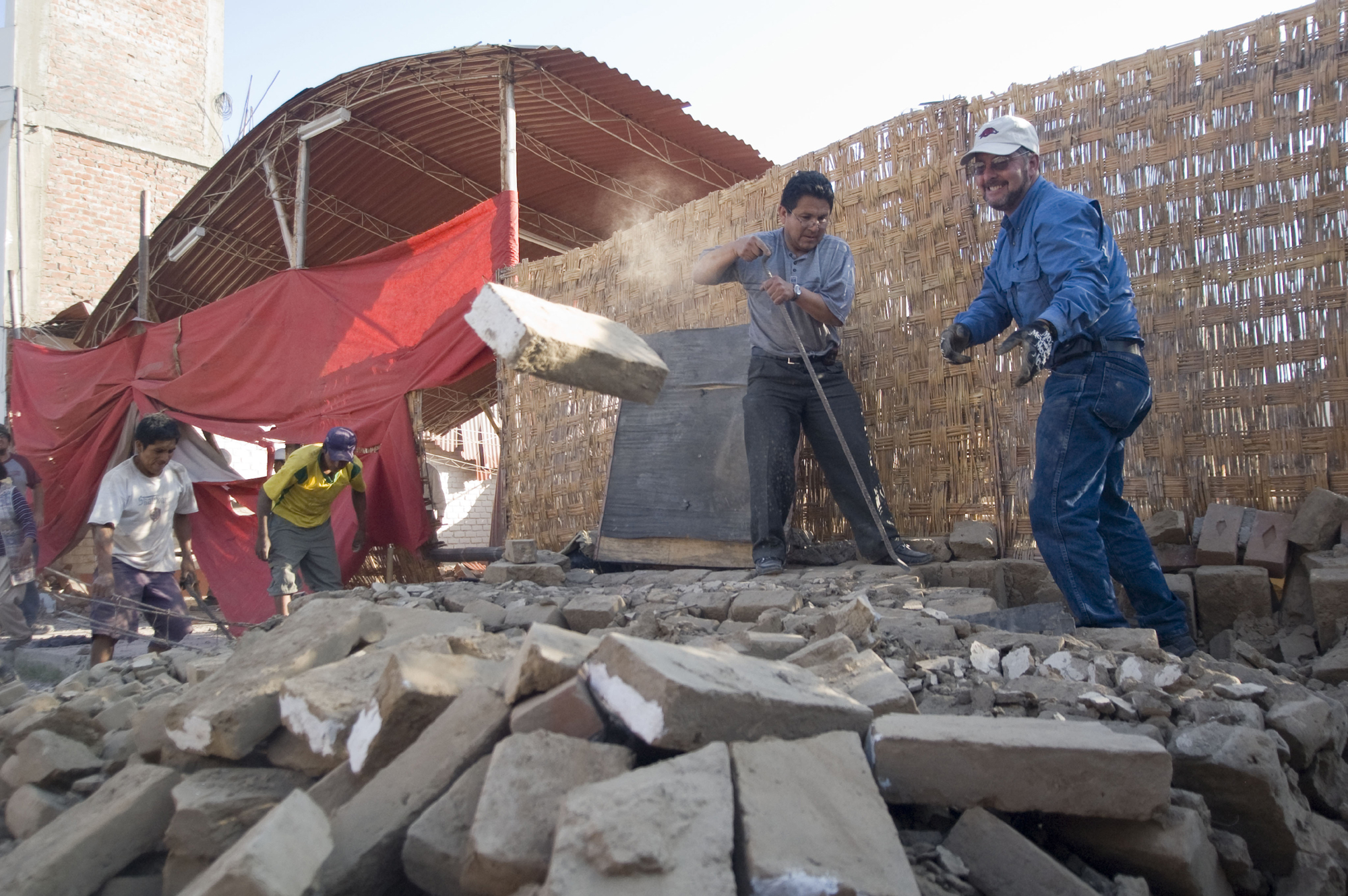
ICA, Peru (BP)–It wasn’t the first time Ester Muñoz pulled her invalid grandfather from his home in an attempt to save his life.
When flooding and landslides damaged thousands of homes in southern Peru in 1998, Muñoz carried Carlos Cajo Cortez to safety. Almost 10 years later, she did it again, but this time the earth was swaying beneath her feet. If Muñoz had not been running late to attend Mass in Palazuelo Este on Aug. 15, she may not have been able to save 98-year-old Cortez during the 8.0-magnitude earthquake.
“Gracias a Dios!” she says, thanking God she was there to pull her grandfather from his home.
Like many residents of Palazuelo Este, Muñoz still lives in a temporary structure the Peruvian government provided following the flooding and landslides of 1998. Though these structures withstood the quake, most of the adobe additions that residents built lie in ruins.
Muñoz’s house was damaged during the quake, but she still has a roof over her head, making her one of the fortunate ones in the outlying communities of Ica.
In the nearby community of Los Olivos, Southern Baptist relief workers estimate that all 1,200 residents are homeless because of the quake.
After three weeks of ongoing damage assessments and food distributions, a team of International Mission Board missionaries, volunteers and national believers is reaching out to those communities like Palazuelo Este and Los Olivos that have received little to no government aid.
MEETING THE NEED
IMB missionary Ted Ortigo steps over the piles of rubble spilling onto the sidewalk. The mounds of debris make vehicular traffic impossible on this street in Ica.
It’s about 1:30 a.m., but Ortigo is alert as he walks the six blocks between the hostel where he’s spending the night and a local church. A team of IMB missionaries and local believers is waiting there to unload a truck filled with supplies for earthquake survivors.
“When you have to wake the guy up to let you out of the place where you’re staying,” Ortigo says, “and he’s unlocking doors and taking bars off to let you out, you’re thinking, ‘You know, these guys live here, and they don’t want to be out here at night. Why am I going?’
“And then you realize why you’re going, and everything’s OK.”
Having worked in several disaster zones in the past, Ortigo knows people become increasingly desperate when time passes and they’ve received no aid.
“So that makes us have to work kind of weird hours just to get the supplies in, and then we do distributions during the day,” Ortigo says. “You just have to stay focused on the need.”
With the U.S. Geological Survey estimating that more than 35,000 buildings were leveled during the quake, the need is great in outlying areas from the town of Ica.
IMB missionaries and national believers are working within the structure of a pre-existing social welfare program to ensure community members are benefiting from relief efforts. By utilizing ollas comúnes (community pots), relief teams have delivered foodstuffs -– rice, sugar, noodles, oil, grain, split peas and milk -– to a central location where a community leader makes sure the people are fed.
IMB missionary Wayne Brinkley looks out at the 38 faces of national believers and fellow IMB missionaries who’ve gathered for a morning briefing at their base camp in Ica.
“When we go out there, we need to mingle among the people,” Brinkley says, encouraging the group to take every opportunity to pray for those who’ve lost loved ones and homes in the disaster. “We need to be concentrating on trying to reach out to them.
“Personal, one-on-one contact -– picking up bricks with them -– that’s what’s going to make the difference,” Brinkley says.
As relief teams travel to the outlying communities of Ica each day, IMB missionary Jack Sheridan says a sense of normalcy is becoming more and more apparent.
When Sheridan first entered the disaster zone 48 hours after the quake, looters ran through the streets with guns as aftershock tremors shook an already panicked population.
“You could see the expressions on their faces,” Sheridan says. “They didn’t know what to do. They didn’t know where to go. They didn’t know where to turn. They were just at a complete loss.”
But Brinkley says the sense of trauma that ensued within the first few days following the quake is beginning to subside.
“The difference is like night and day from what we saw initially,” he says.
Standing beside the crumbled remains of his home in Los Pollitos, Reuben Escobar Bellido watches a cluster of young boys kicking a soccer ball across the street.
“Some of us have lost members of our family,” Bellido says, “but some of us are still here, and we need to keep living.”
–30—-
Kristen Hiller is a writer and photographer with the Southern Baptist International Mission Board.















